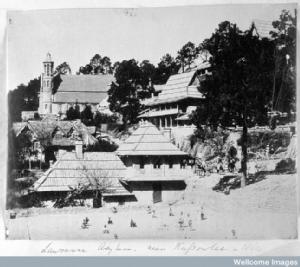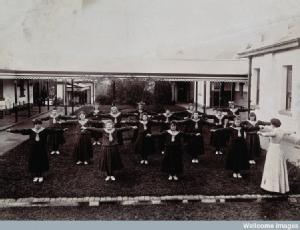TOPIC 9 (TERM 2, WEEK 1): INTRODUCTION
This week we explore the relationship between race and madness, in terms of the theories which connected race to psychiatry and the classification of mental disorder, as well as the treatment and management of madness in colonial and post-colonial contexts. During the nineteenth century the management of the mentally ill took place in new arenas, in asylums set up in a variety of colonial contexts. Here work was shaped by pragmatic considerations and the apparent urge to regulate and preserve all aspects of colonial life. Asylums followed the dictates of moral management, and also adapted themselves to dealing with local (and oftentimes also migrant) populations and, in settler colonies, imposed racial segregation as an organising principle. We will explore how far asylum regimes responded to racial theories and the degree to which they evolved ideas on mental breakdown that went beyond the stereotyping of 'racial types' and behaviours. Though you may develop your readings around other geographical contexts (including for your long essay), the main focus this week will be on Africa. This theme segues into next week’s session on migration and mental illness, where we will largely focus on Ireland and Australasia.
QUESTIONS
- How did theories of racial difference shape ideas on madness and its management in colonial contexts?
- In what ways did the treatment of insanity differ in colonial contexts?
- Is there an alternative dialogue of insanity that reflects the views of indigenous populations?
- When Empire ended, what were the consequences for ideas about insanity and its treatment?
ESSENTIAL READING
The reading this week is in two parts. In the first hour we will explore the management and regimes imposed in African asylums, focusing largely on the nineteenth century, and connections between racial theories and practices.
Please read at least two of the following articles:
Sally Swartz, ‘The Black Insane in the Cape, 1891-1920’, Journal of South African Studies, 21 (1995), 399-415. e-journal
Harriet Jane Deacon, ‘Madness, Race and Moral Treatment: Robben Island Lunatic Asylum, Cape Colony, 1846-1890’, History of Psychiatry, 7 (1996), 287-97. e-journal
Shula Marks, ‘Every Facility that Modern Science and Enlightened Humanity have Devised’: Race and Progress in a Colonial Hospital, Valkenberg Mental Asylum, Cape Colony, 1894-1910’, in Insanity, Institutions and Society, pp. 268-91. e-book
Sally Swartz, ‘Colonising the Insane: Causes of Insanity in the Cape, 1891-1920’, History of Human Sciences, 8 (1995), 39-57. e-journal
Joanthan Sadowsky, ‘Psychiatry and Colonial Ideology in Nigeria’, Bulletin of the History of Medicine, 71 (1997), 94-111. e-journal
In the second hour, we will focus on perceptions of mental illness among African communities and indigenous populations more broadly, and on changes and continuities in institutions of ideas of race and psychiatry as Empire ended.
For the second hour, please read at least two of the following:
Jonathan Sadowsky, Imperial Bedlam: Institutions of Madness in Colonial Southwest Nigeria (California University Press, 1999), ch. 5, 'The Confinement of Isaac O: A Case of "Acute Mania"'. Chapter scanned and Talis Aspire
Matthew Heaton, Black Skin, White Coats: Nigerian Psychiatrists, Decolonization, and the Globalization of Psychiatry (Columbus, Ohio University Press, 2013), ch. 2. Chapter scanned and Talis Aspire
Yolanda Pringle, 'Investigating "Mass Hysteria" in Early Postcolonial Uganda: Benjamin H. Kagwa, East African Psychiatry, and the Gisu', Journal of the History of Medicine and the Allied Sciences, 70 (2015), 105-36. e-journal
Sloan Mahone, 'The Psychology of Rebellion: Colonial Medical Responses to Dissent in British East Africa', Journal of African History, 47 (2006), 241-58. e-journal
FURTHER READING
* Sander L. Gilman, Difference and Pathology: Stereotypes of Sexuality, Race, and Madness (Cornell University Press, 1985), ch. 5, ‘On the Nexus of Blackness and Madness’, pp. 131-49. Chapter scanned and Talis Aspire
* Martin Summers, '"Suitable Care of the African When Afflicted with Insanity": Race, Madness, and Social Order in Comparative Perspective', Bulletin of the History of Medicine, 84 (2010), 58-91. e-journal
* Letizia Gramaglia, 'Migration and Mental Illness in the British West Indies 1838-1900: The Cases of Trinidad and British Guiana', in Catherine Cox and Hilary Marland (eds), Migration, Health and Ethnicity in the Modern World (Houndmills: Palgrave Macmillan, 2013), pp.61-82. e-book
* Roy Porter and David Wright (eds), The Confinement of the Insane: International Perspectives, 1800-1965 (Cambridge University Press, 2003) (Impressive study of different national contexts, including India and Africa.) e-book
* Sloane Mahone and Megan Vaughan (eds), Psychiatry and Empire (Basingstoke: Palgrave Macmillan, 2007). e-book
* Len Smith, Insanity, Race and Colonialism: Managing Mental Disorder in the Post-Emancipation British Caribbean, 1838-1914 (Basingstoke: Palgrave Macmillan, 2014). e-book
INDIA
|
* Waltraud Ernst, ‘European Madness and Gender in Nineteenth-Century British India’, Social History of Medicine, 9 (1996), 357-82. e-journal
* Waltraud Ernst, ‘Out of Sight and Out of Mind: Insanity in Early-Nineteenth-Century British India’, in Insanity, Institutions and Society, pp. 245-67. e-book
Waltraud Ernst, Mad Tales of the Raj (London and New York: Routledge, 1991). e-book
Waltraud Ernst, ‘Asylums in Alien Places: The Treatment of the European Insane in British India’, in Anatomy of Madness III, pp. 48-70.
* James Mills, Madness, Cannabis, and Colonialism: The ‘Native Only’ Lunatic Asylum of British India, 1857-1990 (London: Macmillan, 2000). e-book
|
 |
AFRICA
** Sally Swartz, ‘The Black Insane in the Cape, 1891-
1920’, Journal of South African Studies, 21 (1995), 399-415. e-journal
** Harriet Jane Deacon, ‘Madness, Race and Moral Treatment: Robben Island Lunatic Asylum, Cape Colony, 1846-
1890’, Hisory of Psychiatry, 7 (1996), 287-97. e-journal
* Shula Marks, ‘Every Facility that Modern Science and Enlightened Humanity have Devised’: Race and Progress in a Colonial Hospital, Valkenberg Mental Asylum, Cape Colony, 1894-
1910’, in Insanity, Institutions and Society, pp. 268-91. e-book
* Sally Swartz, ‘Colonising the Insane: Causes of Insanity in the Cape, 1891-
1920’, History of Human Sciences, 8 (1995), 39-57. e-journal
Sally Swartz, ‘Lost Lives: Gender, History and Mental Illness in the Cape, 1891- 1910’, Feminism and Psychology, 9 (1999), 152-8. e-journal
Jonathan Sadowsky, Imperial Bedlam: Institutions of Madness in Colonial Southwest Nigeria (California University Press, 1999).
Joanthan Sadowsky, ‘Psychiatry and Colonial Ideology in Nigeria’, Bulletin of the History of Medicine, 71 (1997), 94-111. e-journal
* Jack McCulloch, Colonial Psychiatry and the ‘African Mind’ (Cambridge University Press, 1995). e-book
* Megan Vaughan, Curing their Ills: Colonial Power and African Illness (Cambridge: Polity, 1991), ch. 5 ‘The Madman and the Medicine Man: Colonial Psychiatry and the Theory of Deculturation’. Chapter scanned and Talis Aspire
Richard C. Keller, Colonial Madness: Psychiatry in French North Africa (University of Chicago Press, 2007), ch. 5. e-book
|
AUSTRALIA AND NEW ZEALAND
Angela McCarthy, ‘Ethnicity, Migration and the Lunatic Asylum in Early Twentieth-Century Auckland, New Zealand’, Social History of Medicine, 21 (2008), 47-65.e-journal
Catharine Coleborne, 'Locating Ethnicity in the Hosptials for the Insane: Revisiting Case Books as Sites of Knowledge Production about Colonial Identities in Victoria, Australia, 1873-1910', and Maree Dawson, 'A Degenerate Residuum? The Migration of Medical Personnel and Medical Ideas about Congenital Idiocy, Heredity, and Racial Degeneracy between Britain and the Auckland Mental Hospital, c.1870-1900', in Angela McCarthy and Catharine Coleborne (eds), Migration, Ethnicity, and Mental Health: International Perspectives, 1840-2010(New York and Abingdon: Routledge, 2012), 72-90, 91-106. e-book
Catharine Coleborne, ‘Families, Patients and Emotions: Asylums for the Insane in Colonial Australia and New Zealand, c.1880-
1910’, Social History of Medicine, 19 (2006), 425-442. e-journal
Catharine Coleborne, Madness in the Family: Insanity and Institutions in the Austalasian Colonial World, 1860-1914 (Houndmills: Palgrave Macmillan, 2009). e-book
Diane Kirby and Catharine Colborne (eds), Law, History, Colonialism: The Reach of Empire (Manchester: Manchester University Press, 2001).
Stephen Garton, Medicine and Madness: A Social History of Insanity in
New South Wales, 1880-1940 (Kensington: New South Wales University Press, 1988). e-book
Susan Piddock, A Space of their Own. The Archaeology of Nineteenth Century Lunatic Asylums in Britain, South Australia, and Tasmania (New York: Spinger, 2007). e-book
|
 |
IRELAND
* Mark Finnane, Insanity and the Insane in Post-Famine Ireland (London: Croom Helm 1981). e-book
* Mark Finnane, ‘Asylums, Families and the State’, History Workshop Journal, 20 (1985), 134-48. e-journal
* Catherine Cox, Negotiating Insanity in the Southeast of Ireland, 1820-1900 (Manchester: Manchester University Press, 2012). e-book
* Oonagh Walsh, ‘“The Designs of Providence”: Race, Religion and Irish Insanity’, in Insanity, Institutions and Society, 1800-1914, pp. 223-42. e-book
David Healy, ‘Irish Psychiatry in the Twentieth Century’ and Pauline M. Prior, ‘“Where Lunatics Abound”: A History of Mental Health Services in Northern Ireland’, in 150 Years of British Psychiatry II, pp. 268-91, 292-308.
Pauline M. Prior, Murder and Madness: Gender, Crime and Mental Disorder in Nineteenth-Century Ireland (Dublin and Portland, Oregan: Irish Academic Press, 2008).
Pauline M. Prior, ‘Mad, Not Bad: Crime, Mental Disorder and Gender in Nineteenth-Century Ireland’, History of Psychiatry, 8 (1997), 501-16. e-journal
Pauline M. Prior, ‘Prisoner or Patient? The Official Debate on the Criminal Lunatic in Nineteenth-Century Ireland’, History of Psychiatry, 15 (2004), 177-92. e-journal
Brenden D. Kelly, ‘Poverty, Crime and Mental Illness: Female Forensic Psychiatric Committal in Ireland, 1910-
1948’, Social History of Medicine, 21 (2008), 311-28. e-jounal
WALES
(for Scottish confinement refer back to the session on asylums)
** Pamela Michael and David Hirst, ‘Establishing the “Rule of Kindness”: The Foundation of the North Wales Lunatic Asylum, Denbigh’, in Insanity, Institutions and Society, pp. 159-79. e-book
* David Hirst and Pamela Michael, ‘Family, Community and the Lunatic in Mid-Nineteenth-Century North Wales’, in Outside the Walls of the Asylum, pp. 66-85. e-book
T.G. Davis, ‘Mental Mischief: Aspects of Nineteenth-Century Psychiatric Practice in Parts of Wales’, in 150 Years of British Psychiatry II, pp. 367-82.


